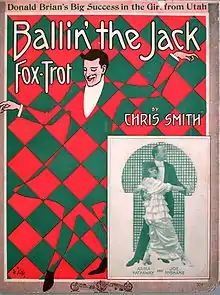Ballin' the Jack
"Ballin' the Jack" (or sometimes "Balling the Jack") is a popular song from 1913 written by Jim Burris with music by Chris Smith. It introduced a popular dance of the same name with "Folks in Georgia's 'bout to go insane." It became a ragtime, pop, and traditional jazz standard, and has been recorded hundreds of times.[1]
| "Ballin' the Jack" | |
|---|---|
 Sheet music cover, 1913 | |
| Song | |
| Published | 1913 |
| Composer(s) | Chris Smith |
| Lyricist(s) | Jim Burris |
Origin
Around the same time the song came out, the expression "ballin' the jack" was used by railroad workers to mean "going at full speed." 'The 'Jack' was the slang name for a railroad locomotive, and balling meant going at high speed, itself derived from the ball type of railroad signal in which a high ball meant a clear line.[2] Why this name was chosen for the dance is not clear.
The composer and entertainer Perry Bradford claimed to have seen the dance steps performed around 1909[3][4] and they are similar to the shimmy which has black African origins.[5][6]
The dance moves were standardized in the Savoy Ballroom, and put to music by Smith and Burris in 1913. The tune became popular in the Ziegfeld Follies of 1913.[3]
See also
References
- Dodd, David G. (2014-12-16). The Complete Annotated Grateful Dead Lyrics. Simon and Schuster. p. 95. ISBN 9781439103340.
- "In Railroading, A 'Highball' Means You're Good To Go". NPR.org. Retrieved 2018-06-04.
- Gammond, Peter (1991). The Oxford Companion to Popular Music. Oxford: Oxford University Press. pp. 36-37. ISBN 0-19-311323-6.
- Watson, Sonny. "BALLIN' THE JACK | Sensual Gyration Dance | features Eagle Rock". www.streetswing.com. Retrieved 2018-06-04.
- Gaunt, Kyra D. (2006-02-06). The Games Black Girls Play: Learning the Ropes from Double-dutch to Hip-hop. NYU Press. p. 101. ISBN 9780814731192.
- Johnson, James Weldon (2009-05-06). The Book of American Negro Poetry. ReadHowYouWant.com. pp. iii. ISBN 9781442928947.
Bibliography
- Burris, Jim (w.); Smith, Chris (m.). "Ballin' the Jack" (Sheet Music). New York: Jos. W. Stern & Co. (1913).
External links
- "Ballin' the Jack", National Promenade Band (Edison Blue Amberol 2480, 1914)—Cylinder Preservation and Digitization Project.